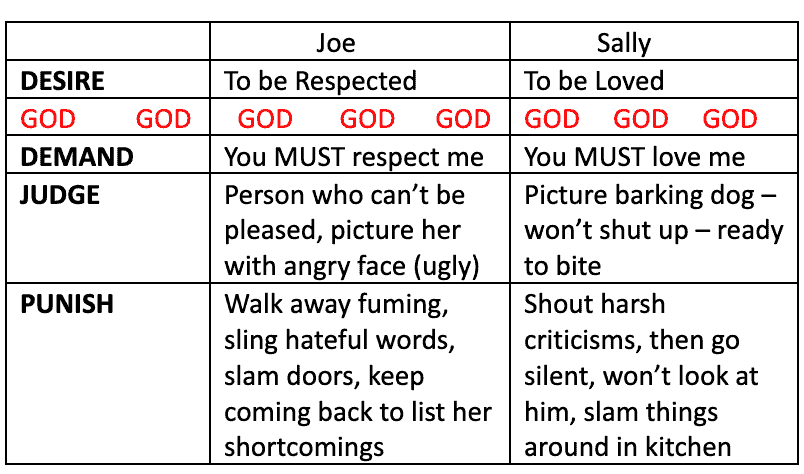You may remember a blog I did recently on “Not Quarrelsome” where I confessed my being convicted by Blackaby’s statement:
If you find yourself often quarreling with others, you need to ask God to clearly reveal your motives and to forgive you for your disobedience to His clear command.
I dealt with the “disobedience” issue in that blog. My conviction was around the statement he added that it is never helpful to argue when in a disagreement with another – just like you can never debate anyone into the kingdom of God. As I said at the time, “OK, I will strike that tactic.” And that’s not easy!
But today, I am feeling the need to share the HOW which scripture gives us. HOW do we behave when we are in a disagreement. (Remember, I had to give up the arguing which is my immediate response.)
(And if it helps you to get back in the mood of it all, you can go back to the previous blog to get the right mindset – HERE )
This is a “tool” of sorts I learned to use years ago. It came from my training after becoming a Certified Christian Conciliator©– it is something we called the ‘Heart Idol process’. You might want to consider it the next time you are trying to figure out why you are in a conflict with someone and arguing just isn’t working.
Of course, it works best if a more neutral party is walking you through this…. just saying. Maybe someone in your church?
The scripture foundation is this…..
James 4 What causes fights and quarrels among you? Don’t they come from your desires that battle within you? 2 You desire but do not have, so you kill. You covet but you cannot get what you want, so you quarrel and fight. You do not have because you do not ask God. 3 When you ask, you do not receive, because you ask with wrong motives, that you may spend what you get on your pleasures.
I have the two parties in the dispute read the full paragraph first — all 3 verses. Then I ask “where is the other guy” in this passage? Count the “you’s” – there is no mention of the “other disputant”. Go back – read it again. Why does it imply “you” are the solo actor?
Silence is the usual answer to my question.
Then I draw on a piece of paper or whiteboard a table of 3 columns & 5 rows – you can do the same. As I have them read sections of the scripture again (and extend it to verses 4-5), I fill in the left-hand column the words in ALL CAPS.
Column 1 / Scripture
DESIRES read 4:1 (I repeat as I write “your desires”)
DEMAND read 4:2a (I repeat “can’t get what you want”)
JUDGE read 4:3 (I repeat “ask with wrong motives”)
PUNISH read 4:2a (I repeat “so you kill”)
As they are pondering the scripture, I put their individual names at the top of columns 2 and 3.
As I started using this tool, I quickly learned that people could not figure out their desires if I started there. So I learned to start at the bottom row – PUNISH – they could easily describe this one. I just ask them to think of the most recent or the biggest fight/dispute (I try to use their words in describing it) and answer how they “punish” each other during it.
Now the talking starts – in fact, it’s rolling out fast and furious. As they talk, I write single words or phrases in each column. Then I check with each to find out if there are additional behaviors they would add to the other person’s list. No one stays silent on this row of information.
Next, I go one row up to “JUDGE” and ask “how are you picturing the other person when you are in the middle of punishing each other”? Again, I make notes by words or phrases. The picture is starting to get filled out. It is interesting how sharing this all out loud begins to take them to a place of listening to each other and realizing their own participation isn’t stellar.
Next, I jump right to the top row “DESIRES” and ask them “What did you really want from the other person”? They may use sentences or phrases but it is amazing how it almost always boils down to one saying “respect” and the other saying “to be loved”.
I write the summary word they share in their columns along the DESIRE row; but then I fill in the DEMAND row. I say something like “you wanted so badly to be respected by them that you turned it into a demand – you MUST respect me” and I write in their stated ‘desire’ word with the MUST in front of it.
Then I ask why are we sliding down those rows like a slippery slope of snow over and over again, doing the same fight over and again. No good answers come out — so I have them read James 4:2b (the second part of verse 2) “You do not have because you do not ask God.”
With a different color of pen or marker, I write the word “GOD” multiple times in a row across the columns just under the DESIRE row.
It also helps to have them review another scripture – Psalm 37:4 at this point: “Delight yourself in the Lord and he will give you the desires of your heart.” We might discuss this a bit more if it would seem to help.
Here is a picture of this for you visual folks out there – that includes me!

After they have walked through this, and had a bit of discussion about the scripture at each point, I take them back to James 4 and have them read verses 4-5:
You adulterous people, don’t you know that friendship with the world is hatred toward God? Anyone who chooses to be a friend of the world becomes an enemy of God. Or do you think Scripture says without reason that the spirit he caused to live in us envies intensely?
I then ask them “why is James calling you ‘adulterous’?” It takes some discussion time to get around to the true understanding of points that are important here:
We are talking about spiritual adultery, being spiritually unfaithful
We are loving the worldly ways rather than God and His ways
The spirit he caused to live in us references the fall of man – we envy intensely and I will take them back to the mention of “covet and kill” in v. 2
Tim Keller, Counterfeit Gods, says an idol is “anything more important to you than God, anything that absorbs your heart and imagination more than God, anything you seek to give you what only God can give.”
Then we progress to the “good news” that there is a cure for idolatry. Back to the scripture of James 4 looking at verses 7-10:
Submit yourselves, then, to God. Resist the devil, and he will flee from you. Come near to God and he will come near to you. Wash your hands, you sinners, and purify your hearts, you double-minded. Grieve, mourn and wail. Change your laughter to mourning and your joy to gloom. Humble yourselves before the Lord, and he will lift you up.
We can sometimes go back to Tim Keller to learn “The Bible uses three basic metaphors to describe how people relate to the idols of their hearts. They love idols, trust idols, and obey idols.” As we let that soak in, the next question they must consider is
What or who are you loving, trusting and obeying in this case?
There are many scriptures that can be explored and used with regard to all facets of idols, worship, etc. but one of the most important to remember is one of the Ten Commandments – You shall have no other gods before me.
What we all struggle to understand and recognize is when we are sitting on the throne of our heart. That is why, I think, verse 10 is so important. It reminds us to humble ourselves before the Lord, and he will lift you up.
It takes humility to step down off the throne of our own heart and it takes a willingness to love, trust and obey God to sit on the throne of our hearts.
I know, it sounds funny to think we would trust ourselves more than we would trust the Almighty God who is the source, power, creator and finisher of all things. But despite the lack of reason, I have all-too-often found myself up on that throne, directing and demanding. Ugh.
Okay, so now you have the same tool I have to humble me and bring me back to facing my idolatry and giving it up. Amazing how much it takes for me to realize it just isn’t working anyway. But that is why he gave me verse 6 – “But he gives us more grace. That is why Scripture says: “God opposes the proud but gives grace to the humble.”
Hoping this “tool” helps guide you (and others) to the blessing of God’s grace – from your “humbled” fellow idolator.


